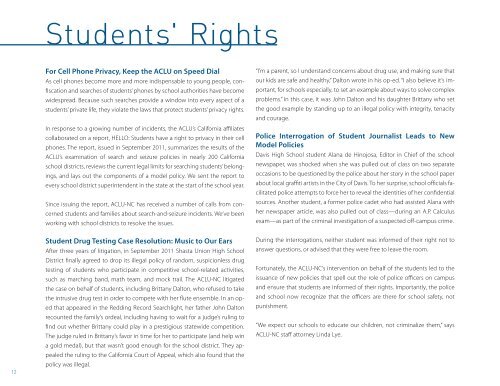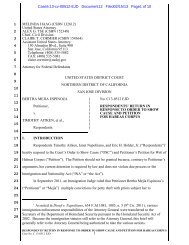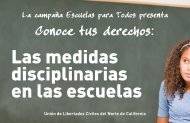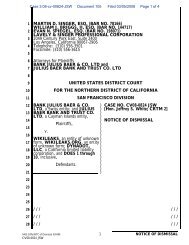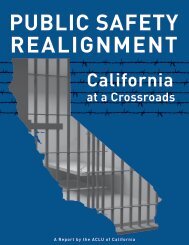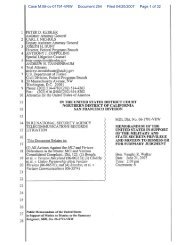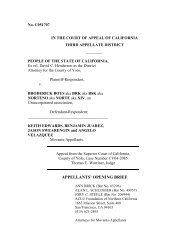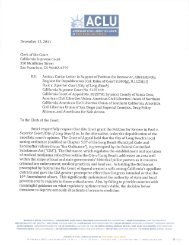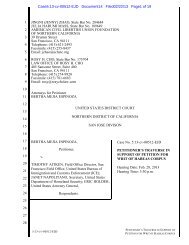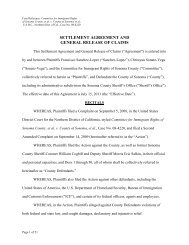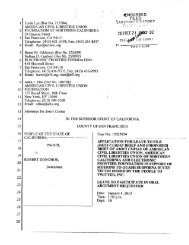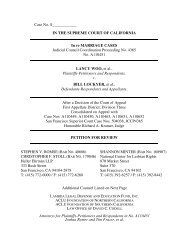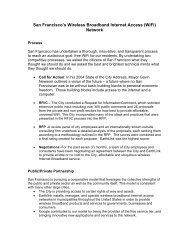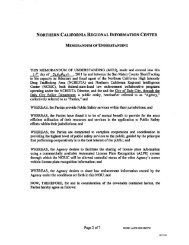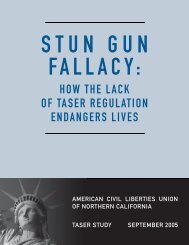Download - ACLU of Northern California
Download - ACLU of Northern California
Download - ACLU of Northern California
Create successful ePaper yourself
Turn your PDF publications into a flip-book with our unique Google optimized e-Paper software.
Students' Rights<br />
12<br />
For Cell Phone Privacy, Keep the <strong>ACLU</strong> on Speed Dial<br />
As cell phones become more and more indispens able to young people, confiscation<br />
and searches <strong>of</strong> students’ phones by school authorities have become<br />
widespread. Because such searches provide a window into every aspect <strong>of</strong> a<br />
students’ private life, they violate the laws that protect students’ privacy rights.<br />
In response to a growing number <strong>of</strong> incidents, the <strong>ACLU</strong>’s <strong>California</strong> affiliates<br />
collaborated on a report, HELLO: Students have a right to pri vacy in their cell<br />
phones. The report, issued in September 2011, summarizes the results <strong>of</strong> the<br />
<strong>ACLU</strong>’s examination <strong>of</strong> search and seizure policies in nearly 200 <strong>California</strong><br />
school districts, reviews the cur rent legal limits for searching students’ belongings,<br />
and lays out the components <strong>of</strong> a model policy. We sent the report to<br />
every school district superintendent in the state at the start <strong>of</strong> the school year.<br />
Since issuing the report, <strong>ACLU</strong>-NC has received a number <strong>of</strong> calls from concerned<br />
students and families about search-and-seizure incidents. We’ve been<br />
working with school districts to resolve the issues.<br />
Student Drug Testing Case Resolution: Music to Our Ears<br />
After three years <strong>of</strong> litigation, in September 2011 Shasta Union High School<br />
District finally agreed to drop its illegal policy <strong>of</strong> random, suspicionless drug<br />
testing <strong>of</strong> students who participate in competitive school-related activities,<br />
such as marching band, math team, and mock trail. The <strong>ACLU</strong>-NC litigated<br />
the case on behalf <strong>of</strong> students, including Brittany Dalton, who refused to take<br />
the intrusive drug test in order to compete with her flute ensemble. In an oped<br />
that appeared in the Redding Record Searchlight, her father John Dalton<br />
recounted the family’s ordeal, including having to wait for a judge’s ruling to<br />
find out whether Brittany could play in a prestigious statewide competition.<br />
The judge ruled in Brittany’s favor in time for her to participate (and help win<br />
a gold medal), but that wasn’t good enough for the school district. They appealed<br />
the ruling to the <strong>California</strong> Court <strong>of</strong> Appeal, which also found that the<br />
policy was illegal.<br />
“I’m a parent, so I understand concerns about drug use, and making sure that<br />
our kids are safe and healthy,” Dalton wrote in his op-ed. “I also believe it’s important,<br />
for schools especially, to set an example about ways to solve complex<br />
problems.” In this case, it was John Dalton and his daughter Brittany who set<br />
the good example by standing up to an illegal policy with integrity, tenacity<br />
and courage.<br />
Police Interrogation <strong>of</strong> Student Journalist Leads to New<br />
Model Policies<br />
Davis High School student Alana de Hinojosa, Editor in Chief <strong>of</strong> the school<br />
newspaper, was shocked when she was pulled out <strong>of</strong> class on two separate<br />
occasions to be questioned by the police about her story in the school paper<br />
about local graffiti artists in the City <strong>of</strong> Davis. To her surprise, school <strong>of</strong>ficials facilitated<br />
police attempts to force her to reveal the identities <strong>of</strong> her confidential<br />
sources. Another student, a former police cadet who had assisted Alana with<br />
her newspaper article, was also pulled out <strong>of</strong> class—during an A.P. Calculus<br />
exam—as part <strong>of</strong> the criminal investigation <strong>of</strong> a suspected <strong>of</strong>f-campus crime.<br />
During the interrogations, neither student was informed <strong>of</strong> their right not to<br />
answer questions, or advised that they were free to leave the room.<br />
Fortunately, the <strong>ACLU</strong>-NC’s intervention on behalf <strong>of</strong> the students led to the<br />
issuance <strong>of</strong> new policies that spell out the role <strong>of</strong> police <strong>of</strong>ficers on campus<br />
and ensure that students are informed <strong>of</strong> their rights. Importantly, the police<br />
and school now recognize that the <strong>of</strong>ficers are there for school safety, not<br />
punishment.<br />
“We expect our schools to educate our children, not criminalize them,” says<br />
<strong>ACLU</strong>-NC staff attorney Linda Lye.


